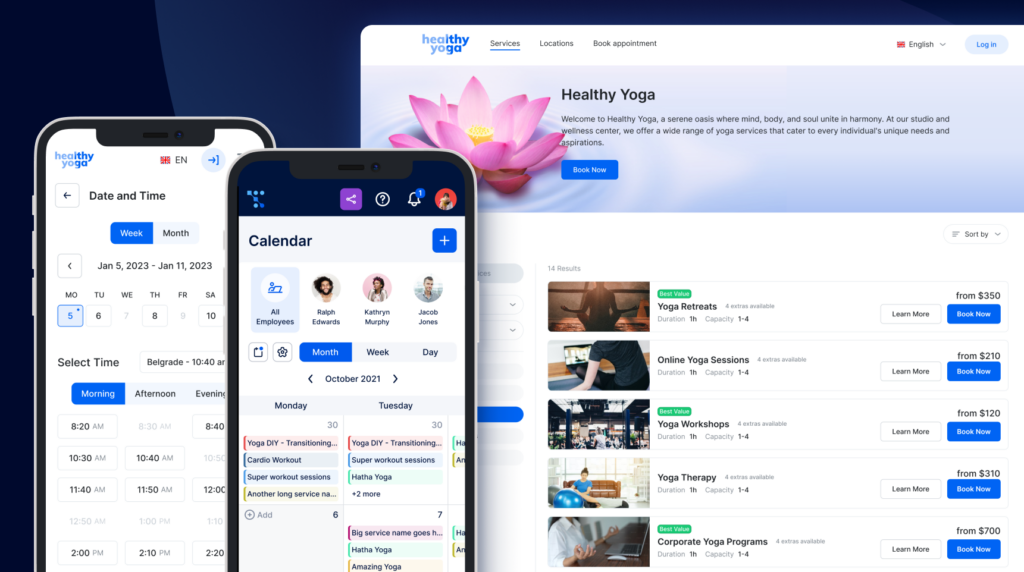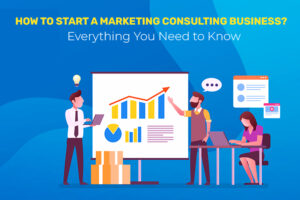Consulting businesses are growing in popularity, and it seems that there are enough potential clients for all of them. Sounds great, doesn’t it? But, how to run a consulting business and ensure its growth and success?
For starters, acquiring new customers is not a stepping stone to worry about. Most consulting businesses stumble further along the way, right when they are supposed to grow the most. It is then that it becomes challenging to offer the right consulting services and to keep the team satisfied.
This is something you should consider too unless you’re playing for second best only. This blog will help you with building and running a successful consulting business in 2024. It’s for those who’ve already started a consulting business, if you haven’t – we’ve got another blog about how to start a consulting business.
What 2024 Has in Store for Consultants?
The dynamic and challenging nature of the current business landscape, coupled with the need for specialized knowledge, makes consulting highly relevant in 2024. As businesses strive for innovation, efficiency, and sustained growth, the expertise of consultants becomes a valuable asset in achieving these goals. Why?
The business world is experiencing rapid changes, from technological advancements to shifts in consumer behavior. Navigating these changes requires expert guidance, and consultants are well-positioned to provide valuable insights.
As businesses grow, decision-making becomes more complex. Consultants bring a fresh perspective and specialized knowledge, helping businesses make informed decisions that align with their goals and adapt to the evolving market.
In 2024, there’s a growing emphasis on specialization. Businesses are seeking consultants with niche expertise to address specific challenges, whether it’s implementing new technologies, navigating regulatory changes, or optimizing operations.
The digital transformation wave continues to reshape industries. Consultants play a crucial role in helping businesses embrace and leverage digital technologies effectively, ensuring they stay competitive in a digital-first environment.
The pace of change requires businesses to be agile and adaptable. Consultants, with their external perspectives and diverse industry experience, can guide organizations in becoming more flexible and responsive to market shifts.
In 2024, data-driven decision-making is at the forefront. Consultants equipped with analytical skills can help businesses harness the power of data, turning it into actionable insights to drive strategic decisions and enhance overall performance.
How to Build a Successful Consulting Business?
Identify your skills, USP and your strengths upfront
If you’re going back and forth on your own consulting business idea, it is probably because you have the necessary knowledge for it. Choose an area you specialize in, such as a marketing consultant, so that you can provide the most value to your customers.
Go for what you do best, and stand out from your competition. You will be able to provide better advice and better service, and customers will appreciate this. Consider having new certifications in your fields and getting international certificates; you can always take the best LSAT prep courses or TOEFL exam preparations to have global certification in the subject you will need.
Try to answer the following questions:
- What are your business goals and what are you passionate about?
- Is there an industry you know particularly well, human resources consulting, for instance?
- What can you bring to the market?
- What is your expertise?
Identify the things you can do particularly well, and use them to your advantage. Remember that to start a consulting business you may also need some licenses and certifications. Let’s see some actionable tips to achieve all this:
- Identify your strengths, skills, and passions. What sets you apart? Conduct a thorough self-assessment to understand your unique qualities and expertise.
- Research the consulting market to identify gaps or areas where there is a demand for specialized services. Look for unmet needs or challenges that businesses are facing.
- Create detailed client personas to understand your target audience. What are their pain points, and how can your specialization address those pain points better than others?
- Analyze your competitors to identify what they offer and where they may be lacking. Look for opportunities to differentiate your services and provide a unique value proposition.
- Invest in developing skills that align with your chosen specialization. Continuous learning and staying at the forefront of industry advancements will enhance your expertise.
Get acquainted with the elevator pitch
The elevator pitch is the first step toward building a customer base. What we mean with this is a short overview of how you solve particular problems, and how this sets you apart from your competitors.
You may go around a bit and explain why you are passionate about this industry, but we recommend you stick to the basics. A consulting service is specific and intentional, and customers want you to address their exact issues. For instance, if you work in human resources, let them know you can help retain talented professionals.
In the long run, your elevator pitch will become your value proposition and the core of your marketing structure. Potential clients will be interested to learn more, so wait for the right time to tell the story of how your consulting firm came to be.
Do some quality branding
You are not only running a consulting business, you are promoting problem solutions.
You want to sell and be effective while doing less and developing a unique consulting business model. Develop a strong brand identity that reflects your specialization. This includes a compelling logo, a consistent visual style, and messaging that communicates your unique value.
This is what your service should reflect. Great branding will help you be remembered and attractive on the market. If you follow industry trends, you will sell more. As simple as that.
Before anything else, analyze your problems and shortcomings, and see how they affect your results. Keep the offer goal-oriented, and tell customers right up front what your consulting business model can do for them.
This refers to all aspects of your branding strategy: wording, logo, name, and even colors.
Build relationships first, and revenue second
It is true, that the whole purpose of running a consulting business is to earn money. And yet, you can’t make money if you don’t build trust first. It is kind of a vicious circle, and you don’t want to run around forever.
The key to good consulting service is to listen, not to speak. Hear what your client has to say before you lock them out with costs and shop talk. If they see you are interested in more than making profits, they may hire you as their long-term sales consultant and refer you to other firms.
Plus, good connections last, and you will always be their number-one choice for consulting services.
As in any other area, communication has paramount importance for a new business. Make the experience great, and keep in touch with customers the way successful consultants do. They will know how to appreciate this.
Set up a strong online presence
Having a compelling online presence is essential if you want your consulting business to be success. Let’s break down the key elements of a website, effective use of social media, and online branding:
Website essentials
- Clear value proposition
Clearly communicate what sets your consulting services apart. Use concise language to explain the value you bring to clients.
- User-friendly design
Ensure a clean and intuitive design that facilitates easy navigation. Users should quickly find the information they’re looking for without unnecessary complexity.
- Professional branding
Consistent branding elements, including a professional logo, color scheme, and typography, create a cohesive and memorable brand image.
- Responsive design
Optimize your website for various devices, ensuring a seamless experience for visitors on desktops, tablets, and smartphones.
- About page
Introduce yourself and your team. Share your expertise, experience, and passion for helping clients. Humanize your brand to build trust.
- Services page
Clearly outline the services you offer. Use compelling language to showcase how your consulting services address specific client needs.
- Case Studies/Testimonials
Highlight successful projects and client testimonials. Real-world examples build credibility and demonstrate the tangible benefits of your services.
- Contact information & booking form
Make it easy for visitors to contact you. Provide a clear booking form, phone number, and email address. Consider adding a location map if applicable.
- Resource section
Regularly publish insightful content related to your consulting niche. This establishes you as an industry authority and boosts your website’s SEO.
- Calls-to-Action (CTAs)
Strategically place CTAs throughout your site, guiding visitors to take specific actions such as scheduling a consultation or downloading a resource.
Social media essentials for successful consulting business
- Choosing social media platforms
Identify the social media platforms where your target audience is most active. Focus your efforts on those platforms to maximize engagement.
- Consistent branding
Maintain a consistent brand identity across all social media profiles. Use the same profile picture, cover photo, and bio information.
- Engaging content
Share a mix of content, including industry insights, thought leadership, and behind-the-scenes glimpses. Use a conversational tone to connect with your audience.
- Visual appeal
Leverage visual content such as infographics, images, and videos. Visuals are more shareable and can help convey complex information in an accessible way.
- Regular updates
Stay active by posting regularly. Consistency is key to building and retaining an audience on social media.
- Interactivity
Encourage engagement through polls, questions, and discussions. Respond promptly to comments and messages to foster a sense of community.
Charge on a project basis
Let’s talk earnings now. The whole reason why we buy things is that we expect something from them. We want results.
This is the approach you should follow. Estimate the project and offer it against a fixed price. Customers prefer that to an hourly payment, as they can plan.
Another benefit for you is that they stay focused on the lasting result, and have a clear overview of the quality of your work. Follow your baseline requirements. Wherever necessary, offer several different pricing scenarios based on the delivered value.
How to Run a Consulting Business: Essential Steps
Don’t worry, it is still not rocket science. If you are an aspiring marketing consultant or work in the human resources consulting area, there is plenty you can do to improve your brand.
Shift from traditional to online consulting
If you haven’t started with online consulting yet, 2024 is the right time to do it. Shifting from traditional to online consulting can be a transformative move, offering opportunities for broader reach and increased efficiency. Here’s a guide to making a successful transition:
- Familiarize yourself with the online platforms and consultant software relevant to your niche. This may include project management tools, video conferencing software, consultant scheduling software, apps, and collaboration platforms.
- Clearly articulate how your consulting services will be delivered online. Outline the process, communication channels, and tools you’ll use to collaborate with clients remotely. Additionally, consider providing equipment for remote workers to optimize their productivity and boost business operations.
- Embrace video conferencing tools for virtual meetings, consultations, and presentations. This helps maintain a personal connection with clients even in an online setting.
- Expand your service offerings by conducting online workshops and webinars. This not only showcases your expertise but also provides valuable content to a wider audience.
- Set up secure online payment systems to facilitate transactions. This ensures a seamless and convenient experience for clients.
Keep the business under control at all times

Building and running a successful consulting business comes with its own issues. It’s not all sunshine and rainbows. Because of that, as your consulting business grows, make sure to stay organized and true to your standards, even if you are crammed with work and short on resources. Great standards attract potential clients and keep them on board.
Luckily for you, most of the managerial tasks can be outsourced to a software solution and not to an actual person. Appointment scheduling, for instance, is one of the tasks that can help the most in a consulting business.
This way, you will save resources and time, and deliver efficient service. Clients will have the possibility to manage their appointments and reach you wherever they are. The biggest advantage of the online tool is that you’ll avoid human errors and there will be no overbooking.
The favorite tool of consulting businesses is Trafft. You can use it even if your work takes place online, thanks to the responsive booking page and advanced scheduling. The tool enables direct meetings and online payments, but also recurring and group appointments. It will also make communication more reliable with SMS notifications and email reminders. Plus, Trafft integrates with Zoom and Google Meet for seamless online consultations.
It doesn’t matter how complicated your scheduling is. Trafft can handle it. It also has a variety of other useful features, such as custom pricing for any type of agency, payment processing and more.
Don’t let your social media posts affect your consulting business
Let’s do a quick test and research your consulting business on Google. What comes up?
Does this result make you happy? Would it intrigue potential customers?
Odds are good there is a forgotten Facebook account or Tweets you wish you never wrote. These things can harm your consulting business, and result in potential clients not trusting you. The very first step is to delete or hide such posts and turn things around with professional blogs and articles.
A very good place to start a consulting business is LinkedIn. This is the richest customer base for consulting services and a place where you can promote your work.
This is how you can enhance your LinkedIn profile:
- Complete it. Potential clients will do deep-dive research on a new business, so make sure everything is there.
- Get a personalized LinkedIn URL for the profile. LinkedIn gives you this option.
- Showcase your skills and your best work, and ask customers for recommendations.
- The headshot must be professional and friendly. The same goes for the short description of your work.
- Enhance your LinkedIn prospecting strategy by exploring LinkedIn automation tools designed specifically for LinkedIn, streamlining and automating various aspects of your outreach for increased efficiency.
Provide external validation of your work for new customers
This may as well be the most efficient consulting business model to consider. Your work is great, we have no doubts about it. But how is that different from the thousands of consulting services out there? It is time to play big.
Regardless of its advancements, a consulting business is a conservative business. It is difficult to reinvent the wheel and do something others didn’t think of. This makes us pretty dependent on competition, and pretty eager to make a unique move that sets us apart.
The good news is the list does go on. You can run your own blog with case studies or even get customers to do this for you. You can pursue and get awards and certifications, work alongside regulatory bodies, and much more.
Get referrals
The best consulting businesses are run by people who know how to network. If this is your case, you’ve done at least half of the job.
Reach out to a successful client, and ask them to refer you to their business partners. Make the deal even better by offering them discounts next time they come to you. Customers will have no problem doing this if they rely on your consulting business.
Each time you complete a project successfully, contact the customer:
- Thank them for choosing your consulting business
- List the results you’ve achieved as cohesive bullet points
- Gather feedback and testimonials, and publish those upon permission
- Ask for referrals at the very end
Draw the line when you have to
Launching your own business is always difficult, and you need as many friends as you can get. A consulting business is no exception to this rule. As a result, you may accept jobs that are not worth it, and which cost you much more time than you have available.
Time is not the only thing that suffers here. Quality does too. If you want to play big, hunt for good offers and big customers, and give them this time.
You can do this by learning to say ‘no’. You will only be able to deliver top work to customers that matter to you.
What Does It Take to Run and Grow a Successful Consulting Business: Takeaway
Running a successful consulting business requires several excellent qualities and skills, and most of those are already there. You need to learn how to conquer the market and cater to customer preferences. Be a listener and a communicator, and keep an open eye for details. Invest in your marketing and your tools, and take the game to the next level. This is the only way to start a consulting business that can make a change.
Once you are inside, keep organized and make informed decisions. Involve your customers in all possible instances, and have them refer you to business partners. Last but not least, take advantage of quality software for a consulting business.
FAQs About Running a Successful Consulting Business
1. What are the key skills required to start a successful consulting business?
You need to be an expert in your subject, have outstanding communication skills, be able to forge relationships with clients and have a penchant for problem-solving in order to launch a successful consulting business. Also, you want to be knowledgeable about finance, marketing, and business operations.
2. How do I identify my target audience and market my consulting services effectively?
Effective marketing requires knowing who your target market is. You can start by investigating your rivals and figuring out what makes you unique from them. Moreover, you can learn more about the requirements and preferences of your target audience by conducting surveys or focus groups.
Once you’ve determined who your target market is, you can create a marketing strategy that incorporates a distinct value proposition, a powerful brand identity, and focused advertising tactics.
3. How can I set my consulting fees and pricing structure to maximize profitability?
It is crucial to take into account aspects like your area of expertise, the difficulty of the project, and consumer demand when determining your consulting rates.
Depending on your inclination, you can charge hourly rates or project-based fees. Profitability can also be raised by providing value-added services or by bundling your offerings. But, it’s crucial to make sure that your costs are reasonable and still bring in enough money to support your company.
4. What are some effective ways to manage client expectations and maintain strong relationships?
For long-lasting relationships, controlling customer expectations is essential. It’s crucial to establish specific objectives, communicate frequently, and be open and honest about your method and schedule.
Building trust and trustworthiness can also be aided by paying attention to the requirements and worries of your clients and immediately fulfilling their demands.
Also, you can improve your relationship with your customers by exceeding their expectations and delivering outstanding customer service.
5. How can I stay up-to-date with industry trends and best practices to offer the most value to my clients?
For you to provide the maximum value to your customers, it is essential to stay current with market trends and best practices.
You can partake in professional development activities, go to conferences, and read trade magazines. In addition, you may stay current on the newest trends and best practices by working with other professionals and networking.
6. What are some effective marketing strategies for promoting my consulting business and building a strong reputation?
Creating a strong brand identity, coming up with a content marketing plan, utilizing social media, and constructing a referral network are all effective marketing techniques for promoting your consulting business.
Adding value-added services, presenting at industry gatherings, and producing thought-provoking content can all help you establish yourself as a reliable advisor.
7. How can I manage my time and prioritize my workload to ensure that I can handle all my client’s needs?
Running a successful consulting business requires effective time management and prioritizing your workload. You can manage your job more effectively by creating a schedule, establishing reasonable deadlines, and assigning responsibilities. Also, it’s crucial to manage your clients’ expectations, set clear standards, and keep good communication with them.
8. What are some common challenges faced by consulting businesses and how can I prepare for and overcome them?
Managing workload and client expectations, severe competition, changes in the economy or sector, and are just a few of the difficulties consulting firms frequently confront.
You can overcome these difficulties by setting yourself apart from the competition by providing a special value proposition, keeping abreast of business developments and best practices, and expanding your network.
By assigning tasks, setting up clear expectations, and prioritizing your work, you may manage your workload more effectively.
9. How can I differentiate myself from other consulting firms and establish a unique value proposition?
You can create a distinctive value proposition that showcases your knowledge, experience, and the particular services you provide in order to set yourself apart from other consulting firms.
You can also concentrate on a certain niche market or provide unique services that other businesses don’t. Also, you can develop a distinctive identity and differentiate yourself from the competitors by building a strong brand image and providing excellent customer service.
10. What are some effective strategies for generating repeat business and building long-term client relationships?
It’s crucial to give excellent customer service, keep open lines of communication, and produce high-quality work to attract repeat business and forge long-term client relationships.
Trust and loyalty can also be developed through providing value-added services, maintaining in touch with your customers, and being attentive to their requirements and issues.
In order to fulfill the changing needs of your customers and maintain your position as a market leader, it’s crucial to continually innovate and improve your services.
11. What are the keys to successful consulting?
Successful consulting is multifaceted and involves a combination of skills, strategies, and approaches. A successful consultant listens actively to client needs, employs strong problem-solving and project management skills, and maintains high ethical standards. Building and nurturing client relationships is paramount, as is a results-oriented approach that demonstrates tangible impacts.
Looking for More Useful Consulting Resources?
If you enjoyed reading this article about how to run a consulting business, you should read these as well:
- How to Promote Your Consulting Business? From A-Z
- The Most Effective Marketing Strategies for Consultants
- The Ultimate Guide to Writing a Consulting Business Plan
- How to Become an Independent Consultant
- How to Get Clients as a Consultant – Quick Guide to Follow
- How Much to Charge as a Consultant



